|
|
|
Sort Order |
|
|
|
Items / Page
|
|
|
|
|
|
|
| Srl | Item |
| 1 |
ID:
116381
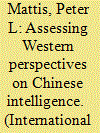

|
|
|
|
|
| Publication |
2012.
|
| Summary/Abstract |
On 21 January 2011, a federal judge sentenced Glenn Duffie Shriver to four years in prison for conspiring to provide national defense information to Chinese intelligence. 1 The media coverage of the sentencing represented a stark contrast to Shriver's arrest-so quiet that not a single major U.S. newspaper covered the story in July 2010-and shows the growing U.S. awareness about the threat from Chinese intelligence operations. Shriver was the latest in a string of arrests going back to 2005 providing evidence to support U.S. counterintelligence officials' claims that the Chinese intelligence services have outstripped Russian intelligence as a threat to American national security.
|
|
|
|
|
|
|
|
|
|
|
|
|
|
|
|
| 2 |
ID:
116388
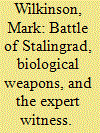

|
|
|
|
|
| Publication |
2012.
|
| Summary/Abstract |
In studying the sources for British foreign policy in the twentieth century we need constantly to remember that we are dealing with a laundered archive.
-Christopher Andrew, 1987 1
The problems associated with the researching of intelligence-related issues have been well documented. The ever-growing and increasingly diverse community of academics immersed in the study of intelligence share a range of common problems related not just to access to material, but also the verification of that material when it is obtained. 2 Indeed, the relative precariousness of much of the work in the field of Intelligence Studies is well recognized. Epistemologically, one of an academic's most significant challenges is attempting to verify potentially valuable material that has come from a limited or fragmentary range of sources. 3 Although the majority of researchers working in the field of Intelligence Studies trained as diplomatic, military, or colonial historians of the twentieth century, in fact, their problems are more inclined to resemble those of historians examining much earlier periods, where documentary evidence is thin. 4 Sometimes they might even resemble the intelligence officers that they are studying, trying to assess a potential "scoop" that has come in from a beguiling, but problematic, single source.
|
|
|
|
|
|
|
|
|
|
|
|
|
|
|
|
| 3 |
ID:
116387
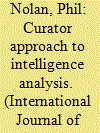

|
|
|
|
|
| Publication |
2012.
|
| Summary/Abstract |
The United States Intelligence Community (IC) is drowning in information. Analysts are losing the war against volume. The next huge "big mistake" won't come from a failure to connect the dots, but instead from missing dots buried in a mountain of noise. Every day, reports from human sources, satellite photography, and signal intercepts flood analysts in growing volumes. In the past decade, this classified flood has been doubled by a tsunami of "open source" information (OSINT)-unclassified, publicly available information from publications, blogs, YouTube videos, Twitter feeds, and so on. Over the past decade, the IC has learned to better collect and use OSINT in its analysis. Though armed with the most expensive and elaborate high-tech tools to manage big data, the IC is running faster to stay in the same place.
|
|
|
|
|
|
|
|
|
|
|
|
|
|
|
|
| 4 |
ID:
116384
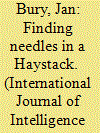

|
|
|
|
|
| Publication |
2012.
|
| Summary/Abstract |
The declassification of formerly Communist Poland's secret police files in recent years allows a broader look at the country's counterintelligence operations conducted during the Cold War. These documents permit extraordinary insight into the capabilities of the Polish counterintelligence apparatus and its perception of Western intelligence tradecraft. These sources, now stored at the Polish Institute of National Remembrance (IPN), disclose the methods and tools implemented by the Eastern Bloc's counterintelligence services which led to their many successes.
|
|
|
|
|
|
|
|
|
|
|
|
|
|
|
|
| 5 |
ID:
116385
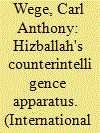

|
|
|
|
|
| Publication |
2012.
|
| Summary/Abstract |
Political scientist Roy Godson defined counterintelligence as the identification and neutralization of the threat posed by foreign intelligence services, and the manipulation of those services for the manipulators' benefit. 1 Organizational counterintelligence disciplines, while having focal entities, typically function as overlays across the whole of the intelligence enterprise. Between 2009 and 2011, the Hizballah organization engaged in a major counterintelligence sweep across Lebanon. Combined with other counterintelligence activity, since the 2006 Summer War (also called the Harb Tammuz) nearly 200 Lebanese citizens-Christians, Sunni and Shi'a Muslims, senior military and retired civilian executives-were arrested and credibly accused of espionage. Some of these Lebanese had spied on behalf of Israel for decades and others were more recently compromised. Following is a discussion of the increasing scope and complexity of Hizballah's counterintelligence apparatus in light of these developments.
|
|
|
|
|
|
|
|
|
|
|
|
|
|
|
|
| 6 |
ID:
116383
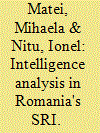

|
|
|
|
|
| Publication |
2012.
|
| Summary/Abstract |
Most intelligence establishments today speak about transformation and about choices among alternatives to improve efficiency, tackle new challenges to national and international security, and offer the best products to their customers. Such plans generally entail a large variety of reforms, ranging from changes in institutional architecture to the enhanced use of new technologies or new managerial tools for improving communication and interaction within the intelligence organizations. Thus, the same overall or strategic concerns trigger a variety of reforms in the different intelligence organizations.
|
|
|
|
|
|
|
|
|
|
|
|
|
|
|
|
| 7 |
ID:
116380
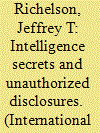

|
|
|
|
|
| Publication |
2012.
|
| Summary/Abstract |
For some, the New York Times is an infuriating newspaper. They may object to the well-left-of-center opinions of its editorial board, rampant nonsense from the keyboards of Thomas Friedman and Paul Krugman, or the evident bias in the news stories on its front page that provide daily entries for TimesWatch. 1 Undoubtedly, a number of United States Presidents have been among those who found the Times annoying for those reasons.
|
|
|
|
|
|
|
|
|
|
|
|
|
|
|
|
|
|
|
|
|